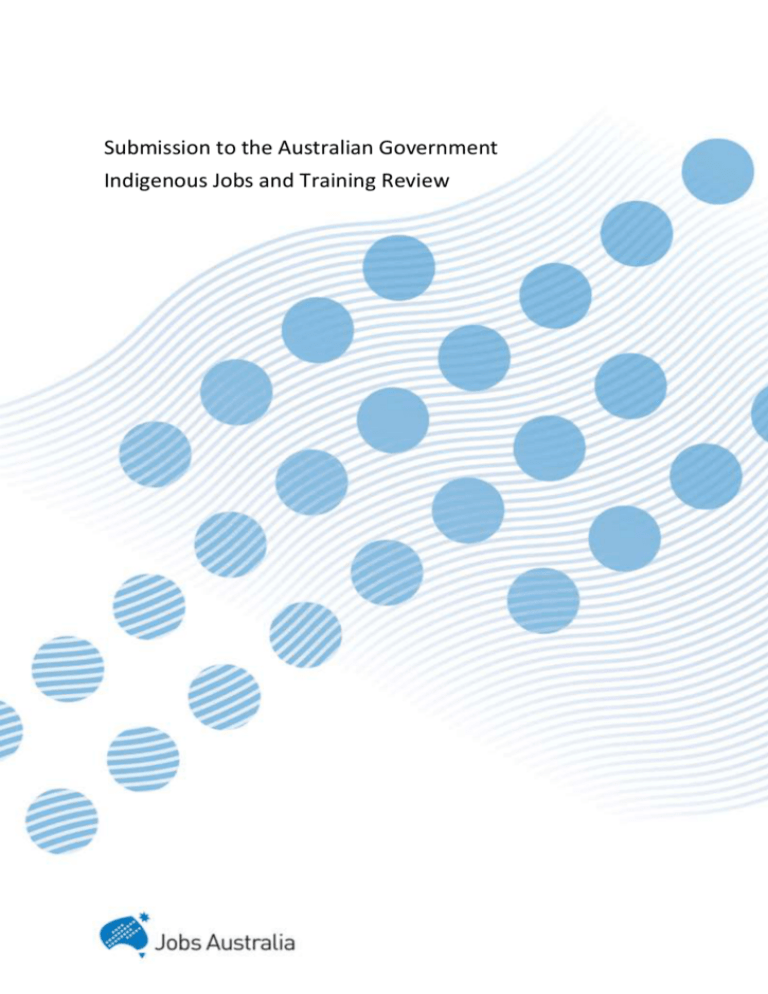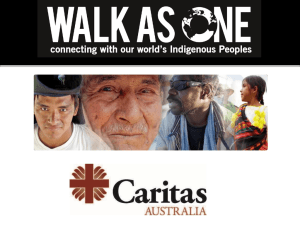248_jobs_australia - Indigenous Jobs and Training Review
advertisement

Submission to the Australian Government Indigenous Jobs and Training Review Contents CONTENTS 1. INTRODUCTION ................................................................................................................................ 1 1.1 2. OUR SUGGESTIONS FOR THE REVIEW .............................................................................................. 1 2.1 2.2 2.3 2.4 2.5 2.6 3. ABOUT JOBS AUSTRALIA ..................................................................................................................................... 1 BUILD ON INDIGENOUS PEOPLES’ STRENGTHS ............................................................................................... 1 BUILD CULTURAL UNDERSTANDING .................................................................................................................. 1 CONSIDER REFORMS TO MAINSTREAM EMPLOYMENT SERVICES (JSA)....................................................... 1 FOSTER A DIVERSITY OF APPROACHES............................................................................................................ 1 CONSIDER THE THINGS THAT WORK ................................................................................................................. 2 CONSIDER GREATER TRANSPARENCY AROUND DATA AND EVALUATIONS ................................................. 2 CONCLUSION .................................................................................................................................... 2 Page 1 1. INTRODUCTION 1.1 ABOUT JOBS AUSTRALIA Jobs Australia is the national peak body for not-for-profit organisations that assist unemployed people into the workforce. We provide an independent voice for our members, who range from large charitable organisations to small local community-based agencies, and help them make the most of their resources. We are proud to be fully funded by and accountable to our members. Jobs Australia also provides the following services that relate specifically to Indigenous communities: 2. The Jobs Australia Indigenous Network: a network of organisations that deliver services (including employment and training services) in Indigenous communities. Jobs Australia plays a leadership role in the network, providing a range of support services to the member organisations and advocating to state and federal governments on behalf of the network members. The Jobs Australia Foundation: delivering the highly regarded Indigenous Youth Leadership Program, a mentoring program developing the next generation of Indigenous leaders. OUR SUGGESTIONS FOR THE REVIEW 2.1 BUILD ON INDIGENOUS PEOPLES’ STRENGTHS While it is important to recognise that poverty and disadvantage exist, this should not be the foundation for training and employment programs. Rather, programs should be locally driven and be strengths based, building on those things a person or community can do and not what they cannot; we should have appropriately high expectations of excellence and success. To that end, wide dissemination of success stories through Indigenous role models and mentors is essential. 2.2 BUILD CULTURAL UNDERSTANDING Australia has a culturally diverse community and many government agencies and community organisations are highly adept at negotiating cultural differences. More can be done, however, in understanding the Indigenous perspective of family and community, particularly when it comes to the benefits of work, remuneration and the way that communities govern themselves and their wealth. In Western culture, ‘work’ encompasses only paid roles, with the benefit in the form of remuneration flowing to the individual (and their family). Indigenous communities have other world views and governing structures which create different models of benefit through participation. This is a fundamental difference and each Indigenous nation has their own particular way of governing wealth. A better understanding of cultural differences is essential in aligning programs with the needs and wants of Indigenous communities. Moreover, employers may need mentoring, training and ongoing support in navigating these differences. 2.3 CONSIDER REFORMS TO MAINSTREAM EMPLOYMENT SERVICES (JSA) In our Blueprint for the Future1, Jobs Australia proposed a new model for Australia’s mainstream employment services system. The model is designed to give providers the freedom to innovate and design services around the needs of the communities in which they operate, fostering a more diverse market of providers that could include industry specialists to better meet the needs of employers in specific industries. In addition, job seekers would be empowered through more choice, better engaging them as coproducers of the outcomes. The model may not be appropriate to all communities (particularly those where there is a complete absence of employment opportunities), some aspects of the model could be drawn upon in the design of other programs. 2.4 FOSTER A DIVERSITY OF APPROACHES Training and employment programs have to function in changing labour markets. In the context of considerations around demand led versus supply led programs, the appropriateness depends on the economic situation. Jobs Australia supports demand-led programs and believes training is more effective where there is direct line of sight to a job, but we also note that these approaches are less effective during an economic downturn. In a downturn, employer demand collapses and the focus has to be on the labour 1 The full document can be downloaded at <http://www.ja.com.au/2015/blueprint> Page 2 supply side – programs need to keep people actively engaged in work related activities or training, so that when the economy recovers and employer demand returns, job seekers are connected to employers in the shortest possible time. Training for the jobs of the future, with no specific job in the line of sight, is entirely appropriate in such a situation. Moreover, economic conditions differ between parts of Australia and even between communities. Asking disadvantaged Australians, particularly Indigenous Australians who have a strong connection with country, to move away from their family and community supports to take up jobs in other parts of the country has proven to be extremely difficult. For more on the issues around labour mobility, see our submission to the Productivity Commission inquiry2 on this subject. Ultimately, a diversity of approaches is needed to match the diverse needs of individuals and communities, and flexibility is needed so that approaches can adapt to changing local economic circumstances. Where appropriate, demand-led initiatives are very effective and should be supported. In locations where employer demand is non-existent, other solutions are needed. 2.5 CONSIDER THE THINGS THAT WORK With the benefit of having read some of the submissions the Review has already received, it is clear that a wealth of information about successful approaches from the organisations that deliver programs directly will be available to the Review. Rather than augment these with further detail on specific programs, we would merely point out that there are some consistencies to successful approaches, including: Building motivation and confidence: often with individuals experiencing the non-material rewards from work, such as approval from one’s peers, and the satisfaction and sense of achievement from contributing to a team project. Line of sight to a job: where training has a visible job outcome at the conclusion to help keep job seekers engaged and motivated. Co-ordinated or ‘wrap around’ servicing: bringing together various services, including health, education and other supports, so that clients are not bounced from one agency to another. Building foundation skills: ensuring a basic level of working numeracy and literacy, an understanding of the expectations in a workplace and other basic work-oriented skills. In addition, successful approaches in Indigenous communities have included: Family centered approaches: where one case manager works with a whole family. Mentoring: both for job seekers and employers, so that each has an understanding of the other’s expectations. Cultural awareness training for employers: to better understand and better navigate the cultural clashes that can occur. Listening to communities: understanding their wants and needs and, ideally, co-designing responses with communities, rather than imposing pre-determined ‘solutions’ from outside. Community plans: including plans to attract investment and create jobs. 2.6 CONSIDER GREATER TRANSPARENCY AROUND DATA AND EVALUATIONS Finally, Jobs Australia would like to see greater transparency around data collected by Government, so that independent analysis by the sector, academics and others can help identify best practice and diffuse innovation across the system. Too much information is currently withheld from public view. 3. CONCLUSION We hope that this submission provides some useful directions for further exploration. We are grateful for the opportunity to make this submission and look forward to participating further in the review. 2 The full document can be downloaded at <http://pc.gov.au/projects/study/labour-mobility>







